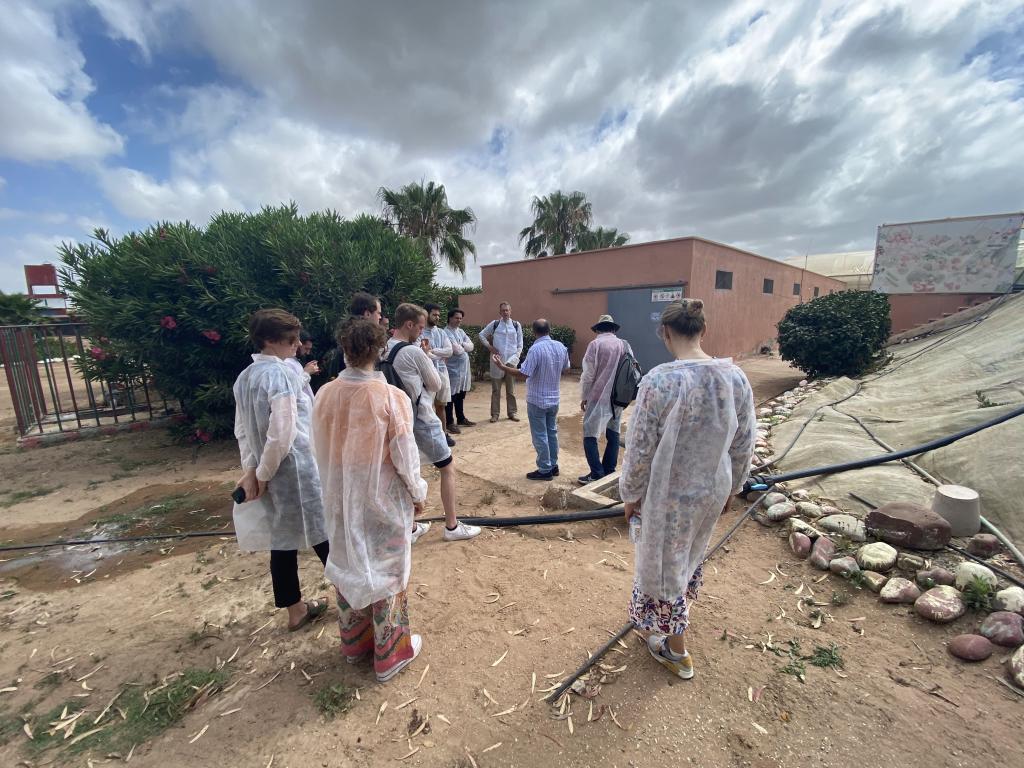To find new ways for a sustainable horticulture in Morocco we have co-initiated ‘Greenport Morocco’, a government-supported impact cluster, with a centre of expertise in Agadir. With several knowledge institutions we are working on a phd-programme and in 2023 we organized a mini-conference with NIMAR, about food, water and energy in the Maghreb region. Students of Leiden, Delft and Rotterdam are involved in our Dutch-Moroccan activities through their research in a Thesis Lab.

The horticulture sector of Agadir faces a challenge to increase greenhouse food production with a minimal use of water. Due to its climate the Agadir region at the Westcoast is a key producer of tomatoes for export to Europe and for the Northern African region. But water scarcity poses a serious threat. Dutch and Moroccan experts have joint forces to find a solution.
Sustainable Moroccan horticulture
Greenport Morocco
We are co-initiator of Greenport Morocco, a partnership of Dutch and Moroccan stakeholders. They will research possibilities and share knowledge about proven technologies to improve the quality of greenhouses and reduce the usage of water and fertilisers. The Centre Expertise d’ Horticulture at the campus of the University Institut Agronomique et Vétérinaire Hassan II serves as the head quarters to showcase innovations.
The collaboration between Moroccan and Dutch companies, researchers and institutes will have a positive impact on the relation between both countries and create international job experience opportunities for young male and female academics. It will also increase economic welfare of the region and improve the cooperation between Moroccan farmers.
Greenport Morocco is an impact cluster, a government-supported program that contributes to the Dutch goals for the private sector, such as job opportunities and sustainable development. In addition to the Leiden, Delft and Erasmus universities it involves various Dutch and Moroccan companies, institutes and organisations as partners and many committed stakeholders.
2024: Dutch Visit in Marocco and Moroccan mission in the Netherlands
Researchers associated with the Leiden-Delft-Erasmus alliance, three Moroccan knowledge institutions, agricultural and horticultural companies and governments from both countries, are finding opportunities for collaboration to make the Moroccan horticultural sector more sustainable. A visit in Rabat and a Moroccan mission in the Netherlands in Februari 2024 strengthen the collaboration.
2023: International collaboration agreement
The University Institut Agronomique et Vétérinaire Hassan II aims to develop the campus of the Centre Horticulture Agadir into a leading horticulture institute in the Middle East and Nothern Africa Region. On the 9th of May 2023, the university has signed a collaboration agreement to create a phd-programme with knowledge institutes from the Netherlands, France, Israel and China. Leiden-Delft-Erasmus is represented by Prof. Dr. Ir. Peter van Bodegom of the Leiden University, who is board member of this program.


2023: Mini-conference: Food Water Energy nexus
In May 2023 the Leiden-Delft-Erasmus Centre for Sustainability has held the miniconference Food Water Energy Nexus on May 10 and 11, 2023 at the Netherlands Institute Morocco (NIMAR). Among the speakers are Prof. Dr. Majid El Ghaib of ESCA University and Dr. Ir. Victor Scholten of TU Delft. The mini-conference was a follow up to a two-day symposium in July 2022. This first symposium, organized by NIMAR and the Dutch Embassy, brought together researchers from both countries and explored possibilities for academic collaboration. The follow up has strengthendd and expanded this network. Furthermore, exchanging ideas will give substance to a multi-year program with concrete research projects for Dutch and Moroccan students and companies. The mini-conference has focused on innovation and entrepreneurship.
Look at the program
2022 and 2023 Thesis Lab: Sustainable Horticulture
How can different crops be used to deal with water scarcity? Who should develop water distribution systems for the greenhouses in Agadir? LDE-students will answer these and other questions through their participation in the Interdisciplinary Thesis Lab about sustainable horticulture. The thesis lab is an initiative of the Leiden-Delft-Erasmus Centre for Sustainability (LDE-CfS). From February until July students will research the various challenges of the Agadir region and visit Morocco to discuss the topics with stakeholders and students. Apart from individual master theses the program will result in a collective approach for involved companies.
